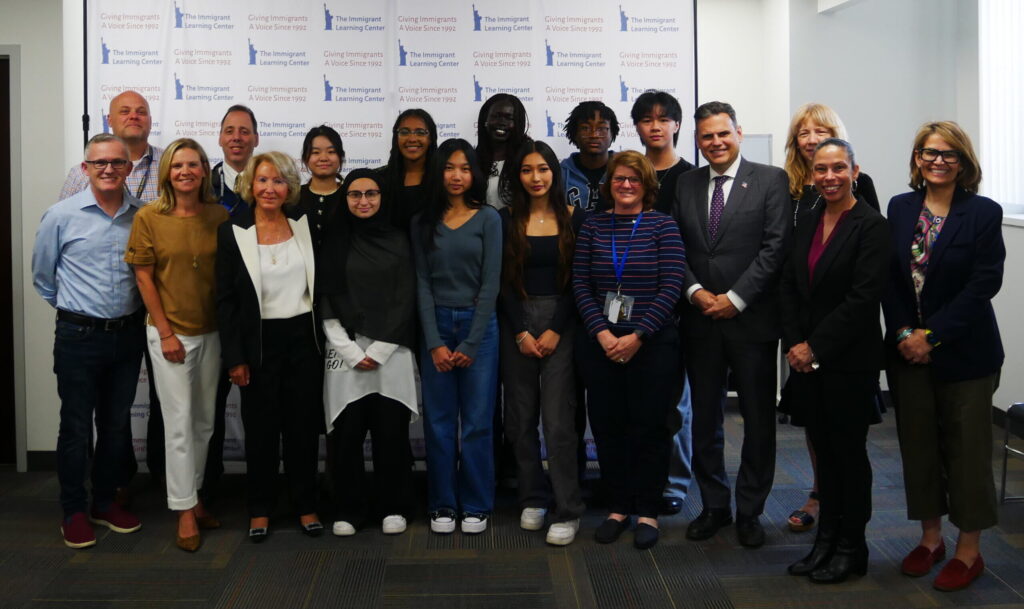
The Immigrant Learning Center holds an annual essay-writing contest celebrating the impact of immigrants and refugees. The topic for 2023 was “How My Community Benefits from Immigration.”
Learn more and read the winning submissions from 2022 and 2023 below.
2023 Winners:
“I was 19 when I left Panama,” my Dad says, “I left behind everything in hopes of finding something here, a better life, better opportunities,” he continues in his thick Panamanian accent that never fails to remind me of the rich history and ancestry that courses through my veins. ”I was surprised to see the snow for the first time…It was really cold over here, I almost thought of going back,” he chuckles. As I sit on the couch bombarding my dad with questions that surely he is proud to answer, I stare in awe at the stories he has to share. These stories are not confined to the four walls of my house but are found all around my community as a whole: Malden.
If you picked two students, at random, from Malden High School, there would be a 76% percent chance they’d be of different race (Ciurczak); this is not evident through solely a statistic but is evident by simply looking around. The halls of Malden High and Malden in its entirety are painted in an array of backgrounds, languages, and customs that fuel our community and enrich its soil. Through the restaurants that line the square – Babas supermarket, Gongcha, Crying Thaiger – to the programs and organizations that work to uplift the immigrant and bipoc voice: AVOYCE, The Immigrant Learning Center, Chinese Culture Connection. All these businesses work in tandem to deliver a unique gift to Malden that many other communities simply cannot: Unity. At a time where our society is so heavily divided in terms of politics, race, and gender all sense of unity and collaboration is a gift that should be valued (Bremmer). It’s easy to remain complacent with the status-quo but takes active effort to elicit change; Malden is a community that strives to achieve the latter.
When sitting in class and having discussions about important topics whether they are about historical events or debates about current world affairs, it’s important to hear opinions that come from different perspectives instead of confining ourselves to a bubble of like minded individuals where all creativity and challenges of thought are lost (Burbidge). Society will not progress if ideas are not being challenged. The social divisions that are prominent in society will remain as such if we cannot learn to listen rather than attack. Though, this is the beauty of Malden; Immigrants and people of all nationalities are able to converse and work with one another to break those aforementioned social divisions.
Malden is a community that fosters, from a young age, the importance of togetherness. Malden is a community raising a generation of open minded individuals that are not afraid to learn nor afraid to ask questions. Malden is a community fostering future leaders and empowering each person to utilize their voice and utilize their story. Malden encourages this as I sit here writing this essay utilizing my own voice to bring light to the gifts Malden has to offer.
The breaking of these social divisions does not have to be done solely through some big protest or large movement but can be attained through smaller everyday experiences such as learning other languages or trying new foods. In my Trig and Pre-Calc class I sit next to a student who recently moved from China. I had lost my glasses and one day I asked him “how do you say ‘I can’t see’ in mandarin?” simply out of pure curiosity “Wǒ kàn bùjiàn” he answered. “Wǒ kàn bùjiàn” I replied, certainly not as well though. Even so, I was proud to have learned something new, something that I may not have been able to learn if I lived elsewhere. Every class after that we’d exchange common phrases in each other’s languages. I can now successfully say “I am hungry” “I am thirsty” “this is so boring” and a plethora of other phrases in a language entirely different from my own. Aside from learning the language, I learned of Chinese customs and culture. He would tell me about schooling in China and its overall history. I was eager to learn and he seemed eager to share. I am grateful that I had the opportunity to sit next to him and grateful that I was able to learn so much. This is the beauty of my community. A place where all backgrounds mesh and create a symphony of blended cultures that one can’t help but stop and listen to. There are so many ways we can achieve unity and togetherness and Malden makes that goal of utmost possibility.
“I will provide you with everything I can. Things I never had,” my dad says. I am a second generation immigrant, mixed afro-latina. My dad is from Panama and my mother is of European descent. I am grateful to live in a community where I am surrounded with people of all different backgrounds that fuel each part of my identity and allow me to embrace it, not hide. When viewing Malden from a more personal lens and how this community shapes me as an individual, I feel I have become someone who has learned to embrace their culture and use it to contribute to my community in any way I can. I have become a more well rounded individual and gained many valuable skills that are all to thank for the diversity present in my community. I am able to stop and listen, learn and understand, empathize and communicate. I am no longer someone who lives in an echo-chamber only consuming information and media that aligns with my beliefs or my parents beliefs but instead learning from so many different perspectives that in turn has molded me into an individual who values that listening is just as important as speaking.
“I’m happy that I never went back,” my dad says. “There are so many opportunities. I built a life here that I would have never been able to build back in Panama” This is the beauty of my community: Malden.
Works Cited
Bremmer, Ian. “The U.S. Capitol Riot Was Years in the Making. Here’s Why America Is so Divided.” Time, 16 Jan. 2021, time.com/5929978/the-u-s-capitol-riot-was-years-in-the-making-heres-why-america-is-so-divided/.
Burbidge, Ian. “Why Diverse Opinions Lead to Better Outcomes.” The RSA, 23 Jan. 2017, www.thersa.org/blog/2017/01/why-diverse-opinions-lead-to-better-outcomes.
Ciurczak, Peter. “Diversity in Massachusetts Schools.” www.bostonindicators.org, 28 Feb. 2020, www.bostonindicators.org/article-pages/2020/february/diversity-in-massachusetts-schools.
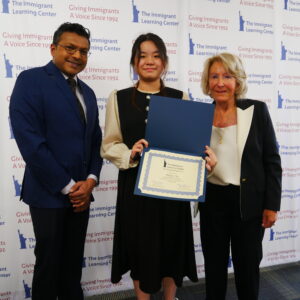 What is a community? While there is not just one definition, I believe a community is defined by how it provides a sense of belonging. It’s where you feel secure and connected with people, like you’re at home: a family. From all parts of the world, different immigrants come to find a new home to find opportunities that weren’t available in their home countries. Upon arriving, many of us believed it would be difficult to find a place of belonging in a ‘new world’ with new people, cultures, and identities. Immigration enriches a community by bringing different perspectives and backgrounds, but ultimately, it offers a sense of belonging that’s open to anyone, no matter where they come from.
What is a community? While there is not just one definition, I believe a community is defined by how it provides a sense of belonging. It’s where you feel secure and connected with people, like you’re at home: a family. From all parts of the world, different immigrants come to find a new home to find opportunities that weren’t available in their home countries. Upon arriving, many of us believed it would be difficult to find a place of belonging in a ‘new world’ with new people, cultures, and identities. Immigration enriches a community by bringing different perspectives and backgrounds, but ultimately, it offers a sense of belonging that’s open to anyone, no matter where they come from.
As an immigrant myself, the United States was indeed a new world for me. When my mother told me about our story when moving from China to the U.S., it felt new yet familiar. Like many families who moved to this country, my parents wanted a better chance in life where they could offer the best education for their children or themselves. It was around February of 2008, and I was still a toddler. Before moving to this country, my parents had to make a lot of preparations to be permitted to go to the other side of the world. Not only was it the first time I’d been away from my extended family, it was permanent. Since it took a while for my aunt to sponsor our immigration, but despite the difficulty, it went smoothly. Once we reached the foreign land, my parents weren’t alone because we were met by my relatives who had already come to the United States before us.
As a child, I never understood why my parents, especially my mother, were always unhappy. But as I got older, I realized that my mother started getting homesick. When my parents and I stayed with my aunt in Dracut, Massachusetts, she was always distressed during our first few years, especially since she had to leave her family behind for a ‘better life.’ Sometimes, she would lose her appetite, and because of this feeling, she felt anxiety that she had never had before. But once we reached Malden, things were starting to become different. My mother was beginning to find her place of belonging by going to the Immigration Learning Center to learn English, where she met people like her. For the first time, my parents had to be independent in a new city with different people because they were in a new place with no one they knew. They wanted to find a home they could call their own to find belonging in this ‘strange’ country. Diversity was a significant factor in moving to Malden, and it helped my parents find a community of their own where they could be themselves without feeling intimidated. They found people like them who decided to stick together and have each others’ backs. My mother became a Buddhist and enjoyed spending time with her group, finally allowing her to have peace with herself. Since she has been in this group for many years, my mother has contributed much to her community, like providing food and offering rides, making her a trustworthy team player. On the other hand, my father wasn’t always at home and rarely had free time because of work, but he has a good set of coworkers, including his sister, who help him out occasionally. This is what being in a community feels like, somewhere where you can feel safe and express yourself without feeling judged, enabling you to contribute to your community and environment, even at home.
As a child who moved to the United States early on, it wasn’t as easy as it was for me to identify as an immigrant. I don’t know how to speak or write Chinese, causing me to be excluded from many things. I couldn’t embrace my heritage, which made me feel like an outsider to other immigrants, specifically those Chinese like me. From a young age, I started growing self-conscious because I could not fulfill my family’s expectations, nor could I be myself with them because they would treat it as ‘too masculine’ or ‘improper.’ Since I am the first generation to come to this country, my family believes I should work hard to succeed.
For a long time, the only communities I have felt I belonged to were my friends and, occasionally, my family. That was until my friend’s cousin recommended that I join a youth program called Asian Voices of Organized Youth for Community Empowerment, or A-VOYCE, which is a program where youths organize for positive change in the community that many of us have come to call home. For once, I was myself without feeling afraid of being judged. Compared to my mother, who found her place of belonging in only a matter of three years, it took me until I entered high school to find it. But I’ve grown to be in touch with where I came from and discovered my own cultural identity. Last year, I stepped out of my comfort zone and advocated for transit equity to the City Council and the Mayor, something my younger self would never dream of doing
To conclude, immigration has many benefits for the communities, even if it’s just a small group of friends or family. Whether they were immigrants or not, everyone’s lives are distinct, and how they choose to live is unique for everyone. However, this doesn’t change the fact that communities are growing daily because of the different people and cultures that inspire others to embrace those differences. Ultimately, everyone is trying to find pockets of belonging so that it may look different for someone else. But in the end, we are always trying to find belonging, finding those places where we can be ourselves without any fear and to give back to the community that has helped us be ourselves when we need it the most.
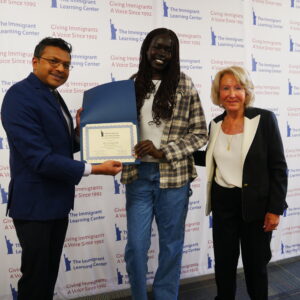 My name is Nyandeng and I am a South Sudanese immigrant that grew up in Malden. The South Sudanese war is the sole reason for my parent’s decision of immigrating to the United States. And to this day my family and I are paying for the consequences that the devastating war has brought. The South Sudanese Civil War is why my mom and I spent years moving from place to place. The South Sudanese Civil War is why all the pressure is on me as the first-born daughter and grandchild to be successful.
My name is Nyandeng and I am a South Sudanese immigrant that grew up in Malden. The South Sudanese war is the sole reason for my parent’s decision of immigrating to the United States. And to this day my family and I are paying for the consequences that the devastating war has brought. The South Sudanese Civil War is why my mom and I spent years moving from place to place. The South Sudanese Civil War is why all the pressure is on me as the first-born daughter and grandchild to be successful.
Because of the South Sudanese Civil War, my father is one of the first “Lost Boys of South Sudan”. My Father and relatives began traveling on their bare feet at the age of eleven to seek shelter and safety. To put it in perspective, when I was eleven I was playing with dolls and learning division. Whereas he was walking from country to country on his own in hopes of a better future. The South Sudanese war is why I have not stepped foot in Sudan. I am eighteen and unfamiliar with my homeland because conflict and violence are still very high. The South Sudanese war ruined my country. It destroyed lives, land, and homes.
Although, The South Sudanese civil war never made me lose my love for my home country. It has made me feel sad. That such a beautiful country has been mistreated and abused for so long. That such a country is put in a negative light in the media. I tend to think about what my life could have been if the civil war had never happened. My parents could have been teachers. My parents could have fulfilled any hopes and dreams crushed by the war. My parents would have never been refugees. I would have never been born and raised in a refugee camp. My family and I wouldn’t be so underprivileged. A Lot more of my relatives would be alive and well today. South Sudan would be happy and healthier.
So it makes no sense to me when ignorant individuals dehumanize or overlook immigrant struggles and issues. My parents sacrificed so much to bring me to this country. They knew I could not get a steady education back home. They had dreams of raising a family in America in hopes of the silver of privilege Americans are born with. I am so grateful for my parents. I never took their hard work and bold moves of moving to a country where they don’t know the language or customs for granted. I took every opportunity I could get in this city. I took all the Honors & AP classes I could, worked as many hours, volunteered for Malden rec and the mayor program, joined clubs, ran for high positions, and did my very best to be a competitor. I gave up my personal life during my time in high school because, at a young age as an immigrant and person of color, I learned I have to be the very best to be considered.
America does not make it easy for immigrants. People put untrue stereotypes that immigrants are lazy, thieves who “steal positions that don’t belong to them,” and unintelligent. America is a place like no other. One side of the country is promoting change and opportunity whereas another part of the country is watching your every move and screaming at you to either “act like an American” or go back to your country or hide your roots. Although, your roots are something you can not permanently change. The way a redhead can not become a natural blond. despite the endless amount of box dye, hair appointments, or touch-ups it just won’t happen. Your roots will always grow out and your natural state will be visible. You can’t be one of them no matter how hard you try. Your “blonde” hair will not shine or darken over time the way a natural blonde does. Eventually maintaining this persona will become tiring and your hair has become damaged. So embracing your roots will do you more justice than damaging them.
Nonetheless, Malden lies in the part of the country that is promoting change. Being from Malden has set me up for success. Malden is such a diverse city that is built upon immigrants. The majority of Malden High’s student body are either immigrants or children of immigrants. These students are all hard-working, resilient, and intelligent individuals. They make up our national honor society (a highly competitive club of which I am an officer), they make up our varsity teams that have made history of advancing in the MIAA state tournament, they make up our volunteer groups, and more. Malden is like an art class where everyone can create art with the colors they possess and share it in the art exhibition. I am glad I lived here because I was able to develop a healthy relationship with my heritage and culture. I never lost my mother tongue. And I can proudly say that I am a South Sudanese immigrant with a successful high school career and will make a difference in the real world. So no matter what I want to pave the way for South Sudanese children or be a role model. I have Malden’s inclusivity to thank for making me believe that I can be the change I wish to see in the world.
To anyone reading this and struggling with your identity just remember Being an immigrant is a beautiful thing. You see things in double vision. You are one of a kind and don’t let anyone take that away from you. Thank you Malden for allowing me to live freely.
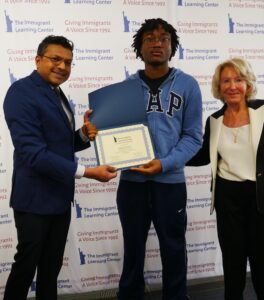 Introduction
Introduction
According to the advocacy group known as the Cato Institute, between 1783 and 2019, 86 million people legally immigrated to the United States. As a recent immigrant, I’m glad to say I’m amongst those 86 million. Although I am glad, I’m also fortunate. Legal immigration is a privilege in the United States because there are millions of people who are forced into difficulties, leaving them with no choice but to immigrate illegally. My mother and I immigrated to this country in early 2017 to join my father, who finally put together the necessary credentials to get us visas. He wanted us to join him not just because of the educational opportunities this country would provide for me, but also to flee the escalating tensions of a civil war in my home country of Cameroon. I will never forget the feeling of finally getting on an airplane with my mom after finally getting through the airport procedures. I felt as if the difficult part of our journey was behind us. A few hours earlier, my mother cried because she thought we lost an important document, only to find out from an airport worker that it held no importance and we were all set to go. The situation was so intense my mother ended up befriending the airport worker. Stories like that spiral through the minds of millions of Americans, each one special from the other. No matter the legality of their immigration process or where they came from, all immigrants have contributed greatly to American society, more precisely in my community of Malden, Massachusetts. We can see these contributions both culturally and educationally. For a broader idea of the previously established contributions, we must take a look at the United States as a whole. Culturally, you can see lots of foreign influences in cuisine. According to the Reader’s Digest, pizza is ranked 4th as America’s most favorite food. If you look at the roots of this cuisine, you will find out that pizza came to America as a result of Italian-American immigrants, with the first pizzeria being opened in New York, around 1905. The same can be said about the educational influence of immigration. According to an article by Drexel University, diversity in US classrooms can make students “more aware of the experiences someone of a different race or cultural group may face”. The article explains that this cultural awareness prepares students for a diverse working environment. The influence of immigration on a national level is very clear, it provides us with the necessary background knowledge to understand the benefits of immigration communities such as Malden, Massachusetts.
Cultural Benefits
Out of all the cultural benefits of immigrants in Malden, the best would have to come from the cuisine. Malden is home to a number of commendable restaurants, a majority of them founded by immigrants, each hailing from a different corner of the world. One example of these restaurants is the All Seasons Table, which serves pan-Asian cuisine. It is ranked first out of the seventy restaurants in Malden, according to TripAdvisor. Another example of such a restaurant would have to be the Habesha Ethiopian Restaurant. It’s a restaurant that serves Ethiopian cuisine and welcomes people of all backgrounds to try their cultural meals. A recent establishment that has become popular amongst students at my school by storm is Kung Fu Tea, an Asian-American-owned bubble tea shop. Although this establishment is more of a franchise, the reason for its popularity in Malden would have to be the popularization by Asian-Americans. While it’s true that these establishments are popular amongst residents in Malden and around the area, they would not be possible without the influence of immigrants.
Educational Benefits
Malden High School is ranked #1 in diversity in Massachusetts. As I am currently enrolled there, I believe no voice is more credible than mine to speak on the educational benefits of being surrounded by so many immigrants and children of immigrants. In Malden, I’ve grown accustomed to interacting with people of different backgrounds in my classes ever since elementary school. The reality is that it has not always been easy. In elementary school, I had a hard time interacting with anyone who did not look like me, because I had fed into the notion that they wouldn’t want to interact with me or would judge me because of my accent. As time went on, I realized they were just as interested to know more about me as I was to know about them. As a result, I would later find out that we even shared similar stories. Although we came from different parts of the world, I steadily got better at understanding how to interact with individuals which I looked nothing like.
Conclusion
In Malden, the motto is “Strong Past, Proud Future”. What if I told you the future of Malden is proud because of the benefits immigrants bring to the city? Only a few cities in the United States can be coined with the title “Little America”, I truly believe Malden has met all the requirements needed for this title. Not only is Malden High ranked first in diversity in the state, but its local economy runs on the sacrifices of hundreds of immigrants who took the risk to spread their culture to the population, unsure of success. Immigration in this city reflects the nation’s ideals of opportunity, diversity, unity, and the pursuit of happiness.
Sources
https://www.cato.org/policy-analysis/brief-history-us-immigration-policy-colonial-period-present-day#executive-summary
https://drexel.edu/soe/resources/student-teaching/advice/importance-of-cultural-diversity-in-classroom/
https://www.thebalancemoney.com/how-immigration-impacts-the-economy-4125413
https://www.tripadvisor.com/Restaurant_Review-g41654-d788238-Reviews-All_Seasons_Table-Malden_Massachusetts.html
https://theculturetrip.com/north-america/usa/massachusetts/articles/top-10-restaurants-in-malden-massachusetts/
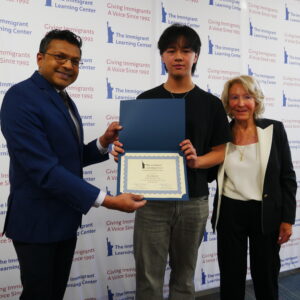 Growing up an immigrant means growing up misunderstood. Growing up an immigrant means growing up between two inherently distinct and separate cultures. Growing up an immigrant means growing up alienated from my homeland several thousand miles away. Yet, growing up an immigrant also means growing up to discover my true identity. It means growing up to understand the many cultural differences that surround me. It means growing up to love my culture.
Growing up an immigrant means growing up misunderstood. Growing up an immigrant means growing up between two inherently distinct and separate cultures. Growing up an immigrant means growing up alienated from my homeland several thousand miles away. Yet, growing up an immigrant also means growing up to discover my true identity. It means growing up to understand the many cultural differences that surround me. It means growing up to love my culture.
In the early 2000s, my parents made the decision to come to the United States from Vietnam in search of a better life—in search of a better future not only for themselves but for us. But doing so has inevitably distorted the way I view my culture and heritage. I grew up without a concrete understanding of what my heritage meant for my family and the countless other Vietnamese immigrants in America. I grew up constantly refusing to learn Vietnamese. Yet, I no longer see myself and my culture through the scope of rejection and distaste. And part of the reason for that is because as I grow up, I am constantly surrounded by more and more people and experiences that allow me to further understand my cultural upbringings. I have lived in Medford my whole life. I have seen the city grow and continually flourish with immigrants and minorities from all parts of the globe, all contributing to Medford with their own unique sense of culture and identity. Places such as the Japanese ramen shop in West Medford to the Korean barbeque and Mexican restaurant in Medford Square are some of my favorite places to eat in the city, but more importantly they serve to reflect Medford’s ever growing diversity and inclusiveness.
There is perhaps no place that encapsulates the growing diversity in Medford more than at Medford High School. Here, I am met with supporting teachers and several activities like the Asian Club and the Diversity & Empowerment Club that have allowed me and many other students a chance to bond over our cultural and ethnic differences and appreciate them for what they are and how they have shaped the greater community.
Whereas in the past, I did not understand what it meant to be an immigrant growing up in an unfamiliar city, I no longer see myself as an isolated and alienated individual. I am part of the many individuals who continue to shape and contribute to Medford through our personal experiences and stories.
Wherever life takes me, I hope to be part of the tens of millions of people who share their life story and experiences as immigrants—immigrants who have made a home in unknown places and forever contribute to the melting pot of culture and diversity that Medford and many other cities and places around the world are becoming.
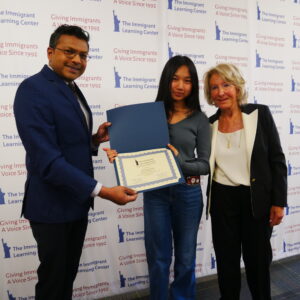 Someone once said that “when there’s a will, there’s a way.” This well describes the ambition of the several millions of immigrants who moved to the United States of America—some coming from only hours away from countries connected by land or others from thousands of miles across the seas; yet all presumably have the same goal of starting a new life, whether it be for themselves, their loved ones, or the future family they planned to realize in the States.
Someone once said that “when there’s a will, there’s a way.” This well describes the ambition of the several millions of immigrants who moved to the United States of America—some coming from only hours away from countries connected by land or others from thousands of miles across the seas; yet all presumably have the same goal of starting a new life, whether it be for themselves, their loved ones, or the future family they planned to realize in the States.
However, many of these immigrants—such as my Vietnamese parents—first lacked the financial means to travel so far. For them, the journey was not only dangerous for having to travel to a foreign country of opportunity roughly 10,000 miles away that they had only heard about through local newspapers about the Vietnam War and the chatty mouths of their neighbors, but it was expensive. It was so, to such an extent, that buying plane tickets became more of a priority than putting food on the table.
Yet, after immense hardship, they did what, unfortunately, many others couldn’t: pack up their suitcases to go to America. I can imagine them being filled with lots of things: clothes, precious belongings, and dreams so big that it would surpass the standard 50-pound weight limit for luggage at the airport.
My mother went to the U.S. first. She had known my father for a long time, having attended school with him. Without knowing what would happen on the journey ahead, it appeared that she and her childhood crush (she was, without her knowing, his crush, too) would part ways forever, thousands of miles apart. Fortunately, my father immigrated to the U.S. a few years later.
Once their feet touched American soil—my mother and father were in different states—more work piled on their shoulders. It ranged from applying to college while taking care of younger siblings to feeling the parental pressure of achieving a career with good income: “I’ve worked hard for you; now it’s your turn.” My mother struggled with the idea of either being a pharmacist in the U.S. or a poor seamstress in Vietnam.
However, speaking English served as one of the most obstructive barriers to their success while also being one of the most important skills to achieve as U.S. immigrants. For a long time, my parents and their families were confined to speaking Vietnamese in a seemingly all-American country. Yet, although their language journey could’ve been easier had they known of the resources available in Greater Boston, such as the Malden Immigrant Learning Center that hosts free English classes, they persevered through hard work and motivation—qualities I still admire about them to this day. Despite their hardship, they were eventually able to navigate their way through college (and the sometimes very confusing MBTA) and toward speaking fluent English. They would also find their way back to each other.
From then on, my mother and father’s immigration journeys merged: they married, finished schooling, and lived together for a long time in my grandparents’ basement until they had the financial means to move out.
Then, my sister was born. My parents were now classified as new immigrant parents, and the road ahead seemed longer. Then, the road doubled in length when I was born. Now that my grandparents helped them immigrate to the U.S. to give them better lives, it was time for them to inherit a similar role for their two kids.
After several moves throughout Greater Boston cities, new beginnings as college graduates entering the workforce, and struggle, my family finally settled in the city of Malden—one close to the city yet with a small-town charm and such diversity expressed in its people and small businesses that gave them a sense of belonging.
Now a student at Malden High School, I realize that my parents gave me the privilege of being exposed to different cultures and backgrounds, including that of my own. Here, instead of hiding my Vietnamese heritage, I can celebrate it as a contribution my family and I and so many others have made to Malden’s immense diversity.
They didn’t know it then, but they definitely know it now: after a long, difficult immigration journey, it landed them in a physically and culturally beautiful city that I am thankful to call home.
However, someone also once said that “when one journey ends, another begins.” As my parents’ comes to an end, it is only the beginning for my sister and I towards having the life they’ve worked decades for in the U.S.—particularly in Malden, a city brimming with so many immigrants, cultures, and colors—and repaying it forward to them and the diverse community I am constantly surrounded by.
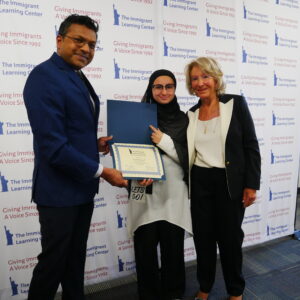 No one said immigration would be easy. It was bound to be difficult for both the parents immigrating and their American children. Being a first-generation child of immigrant parents has the ability to put a lot of demanding yet beneficial pressure on the shoulders of a person, which ultimately helps to shape a hardworking and revolutionary community like Malden.
No one said immigration would be easy. It was bound to be difficult for both the parents immigrating and their American children. Being a first-generation child of immigrant parents has the ability to put a lot of demanding yet beneficial pressure on the shoulders of a person, which ultimately helps to shape a hardworking and revolutionary community like Malden.
As young first-generation children, we are constantly encouraged to try our best and do the absolute most to ensure our success. This motivation instilled in these children from a young age, allowed them to flourish in academics, opening up many doors, that finances could not. With this ambition, so many first-generation children as well as their immigrant parents have worked hard to take up powerful roles in our society for example, many small businesses and organizations were started by these immigrants or their first-generation children. Things like restaurants, associations, and stores all help to support and grow Malden’s economy, allowing for many opportunities to open up for younger generations. Without this ambition, Malden would not have been nearly as powerful as it is today with its rapidly growing population and exciting atmosphere.
In a city like Malden it is quite difficult to imagine what it would be like without immigrants, every corner you turn and every step you take, you witness so many unique qualities. These qualities range from the sight of different clothes, the sound of different languages, and the smell of different foods, a community as rich and diverse as Malden is one that encourages these beautiful differences. People feel confident expressing who they are and aiming high to become the person that they want to be. Without being in such a unique and welcoming environment Malden would not have been able to thrive, immigrants and their first-generation children offer Malden life, diversity, and ambition.
But what is truly thriving? Thriving is the action of flourishing to the best of one’s ability. This can be seen everywhere in Malden, as mentioned before throughout our businesses, communities, population, and most importantly through ourselves. Our environment helps to encourage and uplift us encouraging us to be better, do better, and most importantly live better. We as a community represent a thriving community, our happiness, confidence, ambition, and determination are all influenced by our unique and welcoming environment.
Our ability to thrive is influenced by those around us and their ability to thrive. We as a heavily immigrant-influenced community represent the true ability to thrive as our true authentic selves because of our motivating experiences.
Khando Thoulutsang, 12th grade, chose not to have her essay shared publicly. She won an honorable mention.
Cash Prizes
- 1st place: $500
- 2nd place: $300
- 3rd place: $200
- 4th place: $100
- 5th place: $50
Judges
- Dr. Carmel Salhi, Northeastern University
- Jodie Zalk, Malden Reads
- Mark Puleo, Brazilian Magazine
Evaluation Guidelines
- Submissions are evaluated on content, creativity and message.
- Submissions are not judged solely on English proficiency.
- Submissions by multilingual learners are encouraged.
Award Ceremony
Community leaders, participants, their families and teachers were invited to an awards ceremony at The Immigrant Learning Center that was held on Monday, May 22 at 12:00 PM.
Eligibility and Rules
- Open to all students at Malden High School, Everett High School and Medford High School
- Essay word count: Maximum 1,000 words
- Must be an original piece of writing
- All entries must be sponsored by a high school teacher, parent, guardian or other adult. The sponsoring adult will be the primary point of contact.
- Essay must be in English. English learners are encouraged to apply.
- There is no entry fee.
- One entry per person
- Previous award winners are not eligible.
The deadline for 2023 submissions has passed. The essay contest will return in 2024.
Contact Ariana Moir at [email protected] with any questions.
2022 Winners:
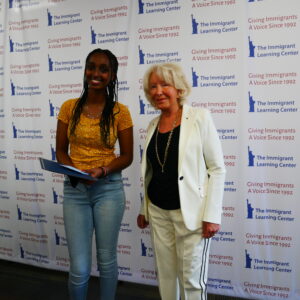 Out of the 59,675 people living in Malden as of the 2020 nationwide census, 42.7% are immigrants (“Malden”). This is over twice the number of foreign-born residents in 1990. Malden has quietly become the leading destination for new members of this nation, meaning that almost half of the people we see on a daily basis were not born in the United States, and this plays a vital role in our city. Immigrants from Haiti, Morocco, China, Pakistan, India, and a collection of other nations, come to Malden because of its exceptional schools and safe neighborhoods (Sachetti). This has helped build a strong community in the workplace, in education, and in a variety of other places. The embracing of others has been a prominent characteristic of this city for decades. Malden, for instance, has aided in harboring “Jewish immigrants who fled Europe before and after World War II” (Sacchetti). It is through immigrants that this city has become the area with the second most foreign-born residents in the entire state and they have resulted in a large number of benefits as well. Programs such as the Immigrant Learning Center, for example, provide individuals emerging from all over the world with free English classes and grant them the opportunity to be heard (“English”). These actions serve to form an even stronger bond between residents of Malden and further enhance the community around us.
Out of the 59,675 people living in Malden as of the 2020 nationwide census, 42.7% are immigrants (“Malden”). This is over twice the number of foreign-born residents in 1990. Malden has quietly become the leading destination for new members of this nation, meaning that almost half of the people we see on a daily basis were not born in the United States, and this plays a vital role in our city. Immigrants from Haiti, Morocco, China, Pakistan, India, and a collection of other nations, come to Malden because of its exceptional schools and safe neighborhoods (Sachetti). This has helped build a strong community in the workplace, in education, and in a variety of other places. The embracing of others has been a prominent characteristic of this city for decades. Malden, for instance, has aided in harboring “Jewish immigrants who fled Europe before and after World War II” (Sacchetti). It is through immigrants that this city has become the area with the second most foreign-born residents in the entire state and they have resulted in a large number of benefits as well. Programs such as the Immigrant Learning Center, for example, provide individuals emerging from all over the world with free English classes and grant them the opportunity to be heard (“English”). These actions serve to form an even stronger bond between residents of Malden and further enhance the community around us.
The diversity in Malden is personally one of the biggest reasons I am so proud of my own culture. It is typical for one to lose touch with their heritage when moving to another country, but this will become less likely living in a city as saturated and full of immigrants as Malden. The wide variety of cultures in this city allowed me to understand that just as others have a country they or their parents came from, I also have my own, and no one deserves to be abashed or ashamed of their distinct traditions. Living in Malden has helped me relate to so many new people around the city each and every day, and helped elevate my understanding of my own culture as well. Having two Ethiopian immigrant parents, and seeing Ethiopian restaurants and shops revealed to me how culturally diverse and genuine the residents of Malden are. It is always a shock to observe the different ethnic groups that sit at the tables of an Ethiopian restaurant and it is constantly reassuring to see that. Recognizing this is what helped me break through the mental barrier of the thoughts that people may judge where I come from. Attending a school where the majority of the students identify as a person of color or came from a different country has been a true blessing as well (Wilson). Instead of losing touch with my ancestry, I have grown closer to it as a result of the overflowing number of immigrants in Malden and the heritages I am exposed to daily.
Malden being a largely immigrant populated area not only allowed me to get in touch with my own culture but also the cultures of those around me. Attending Malden High School opened up the opportunity to learn about traditions from all around the globe including the Middle East, Asia, and South America. Living in multi-cultural neighborhoods can allow others, as well as myself, to fully grasp one another’s cultures and experience what it is like to be a part of a community separate from our own. It is simply impossible to act as if our ethical and other differences do not exist; however, we can learn to embrace one another’s customs and lifestyles instead of disregarding them. Our distinctiveness is, after all, what makes us human, and brushing these things aside will only end in ignorance. The Drexel University School of Education article “The Importance Of Diversity & Cultural Awareness in the Classroom” illustrates that exposing youth to the endless quantity of heritages that immigrants introduce can teach students to be more open-minded and accepting in the future. It can also allow students to “empathize with people different from themselves” as stated in the same article. Young developing minds will be able to acknowledge from a young age that not only one view on a given topic exists and it may vary based on individual experiences. The sooner adolescents can absorb this, the better the community around us will flourish.
In closing, immigration has an infinite number of benefits for Malden including growing kind communities in multi-ethnic neighborhoods by allowing others to assimilate the variety of cultures in our city. The soaring amount of customs and heritages also allows the individual to eject any doubt they may have of their traditions, through understanding that each human also has their unique lifestyle. Learning about other cultures will also open the minds of countless students around the city and the multitude of immigrants will teach the idea of acceptance and embrace for others.
Works Cited
“English Language Programs > The Immigrant Learning Center.” The Immigrant Learning Center, 10 Mar. 2022, www.ilctr.org/programs/.
“Malden, Massachusetts Population 2022.” Malden, Massachusetts Population 2022 (Demographics, Maps, Graphs), worldpopulationreview.com/us-cities/malden-ma-population.
Sacchetti, Maria. Boston.com, The Boston Globe, 23 Dec. 2009, archive.boston.com/news/local/massachusetts/articles/2009/12/23/immigrants_transforming_malden_anew/.
“The Importance of Diversity in the Classroom.” School of Education, drexel.edu/soe/resources/student-teaching/advice/importance-of-cultural-diversity-in-classroom/.
Wilson, Maria. “Malden High School Named among the Most Diverse in Massachusetts.” Wicked Local, Wicked Local, 15 Nov. 2021, www.wickedlocal.com/story/free-press-observer/2021/11/15/malden-high-school-named-among-most-diverse-massachusetts/8586749002/#:~:text=About 52.7% of Malden residents, at the Malden Public Schools.
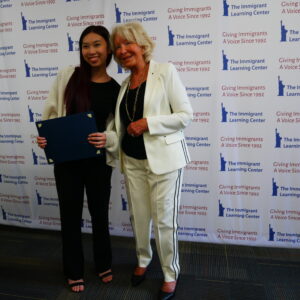 Immigrants are lazy. Immigrants take all the jobs.
Immigrants are lazy. Immigrants take all the jobs.
Immigrants don’t know English. Immigrants speak multiple languages.
Immigrants are criminals. Immigrants are disadvantaged.
Immigrants are poor. Immigrants are hard-working.
Many people have misconceptions about immigrants. They are a walking paradox. Always one thing and another. Some people have a hard time seeing them as three-dimensional people.
My parents are immigrants. My father came to the states in 1988 and my mother in 2004.
In the fall, I will be moving out for college 20 minutes away. I will be nervous, and likely homesick, but then I’ll remember how my parents moved 8,568 miles away from their homeland for me.
How brave they were to leave behind everything they’ve known for children that weren’t even born yet. How determined they were to give my brother and I a life that was worth sacrificing theirs for.
America is the land of the free. Free for citizens and free for those born here. Free for families with ancestors rooted into this country’s soil.
American children are free to take risks and pursue their passions. They don’t feel a strange disconnect from their parents. They aren’t blocked by a language barrier, or worse, a physical wall at the borders.
How brave were my parents for having children they may never be able to communicate with. They encourage us from a young age to learn English so we can get further in life than they ever will, but that only pushes us further away from them.
My mother was a student at the Immigrant Learning Center when she first moved here. I have vague memories of accompanying her to some classes, waving hello to her diverse group of classmates.
As a senior in high school, I have been able to see the rise of immigrants and diversity in our community first-hand. Looking at yearbook photos of classes from even just a few years ago, you can see the lack of color and culture that is so present today in my class and even more so in the ones following us.
Thanks to people like my parents, my friend’s parents, and all of the people that immigrated to this country and decided to settle in Malden, I am able to grow up in an accepting and welcoming environment next to people that resemble me.
To be able to share interests and hobbies with a person is one thing, but to be able to share cultures and experiences is so much more personal. It wasn’t until high school that I was able to connect with people from my background and really start to embrace my identity.
The best way I can describe Malden is like a mirror, or a reflection. When I look at the city of Malden, I am looking at myself. I am looking at the generations before me, and the ones that come after me. I am looking at my childhood self and my future self. At people that look like me, and people that look nothing like me.
I am looking at one thing and another.
When my parents settled down here, they planted new roots for my brother and I. Roots that will be sowed by all the people we meet and learn from, all the different paths of lives we will cross. The cracked sidewalks and flickering streetlights. The public library and the teen center. The pho restaurant that opened down the street from us and the Asian supermarket in the nearby plaza.
No matter how far away life will take me, Malden will always be the place I was made.
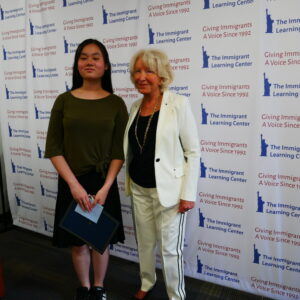 In a city with seeds of diversity planted at every cornerstone, I find that every individual in Malden has contributed their own fragments of “home.” This flourishing city is none like anywhere else in this state, for it is one that breathes and cultivates rich diversity and multiculturalism. As a citizen that once resided in urban Boston and now lives in the suburbs of Malden, I’ve learned that the beauty of the city lies in its prioritization of all those who live there, regardless of social class or background. Malden is a city of immigrants, and it is evident in the buildings, in the stores, in the events, and especially in the school district.
In a city with seeds of diversity planted at every cornerstone, I find that every individual in Malden has contributed their own fragments of “home.” This flourishing city is none like anywhere else in this state, for it is one that breathes and cultivates rich diversity and multiculturalism. As a citizen that once resided in urban Boston and now lives in the suburbs of Malden, I’ve learned that the beauty of the city lies in its prioritization of all those who live there, regardless of social class or background. Malden is a city of immigrants, and it is evident in the buildings, in the stores, in the events, and especially in the school district.
Immigration indubitably fuels Malden, providing it with cultures found from across the world and accumulating a community that advocates for one another, all the whole sharing traditions and different worlds that may have never collided otherwise. With my family being immigrants from Vietnam, I am always wonderstruck by how fortunate we are to live in a community where our voices not only matter but are held in such high esteem by our Mayor and Council. I can look around and see the influences of immigrants, draped in Latin, Asian, and European cultures from across seas and draped with immigrant dreams.
Truly, being a student of Malden High School, I’ve redefined the meaning of diversity and culture, being encompassed by it everyday. By conversing with peers, by studying distinct regions in language and history class, by learning from my friends, by involving myself in clubs, I both form a unity with people of varying cultures and recognize all the world has to offer to us. I learn of numerous religions and of traditional dishes. I learn of individual holidays and their significance for the ones who celebrate them. I learn how to extol the deviations that make ourselves unique. Malden High School is the foundation in which the new generations discover and acknowledge the diversity its corridors and its city bring, as well as the need for immigration to enrich a city’s minds and their willingness to assimilate.
Immigration benefits Malden not in economics or politics, nor for superficial appearances and highly regarded praise. Immigration grants Malden the gifts of the world, more precious than any other: the spreading of culture to every inhabitant and acceptance of the different people of the world. As the daughter of immigrants, this city is my home, and to it, I offer a little piece of Vietnam too.
2022 Honorable Mentions:
- Linh Le
- Saad Mecbah
- Hadjar Yousfi
